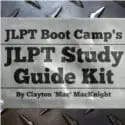N2 is best described as an upper intermediate test. It is equivalent to the old level 2 in theory. But it is actually a bit more difficult because the easier material that was once covered in this level is now being covered in N3. It requires about 600 hours of classroom study to pass this level. Although, you will need significantly more out of class time to study for this level.
JLPT N2 – Basic Info
The N2 covers upper intermediate Japanese. At this level, you should be able to not only read and understand a variety of topics written in simple language, but also be able to start to understand the intentions of the speakers and writers. That’s the real key part of this level. You will have to start doing more inference from the listenings and the readings. The test will no longer be testing you on just the facts.
I believe the N2 was meant to test your ability to work in a mostly Japanese speaking environment. This means you might be conducting a lot of business in English, but have to report things or conduct meetings in Japanese. It is also a good measurement of how well you will be able to handle classes conducted in Japanese. If you can pass this test, you should be able to handle some simpler classes taught in Japanese.
Practice Tests
There are actually three sets of practice tests available for each level of the JLPT. The first set are called ‘sample questions’. These just have two questions for each section. Basically, it is a good way to get a feel for what the test is like and how difficult it is before taking a full practice test. There are also two full practice tests you can download for free as well. The JLPT website refers to these as ‘workbooks’.
JLPT N2 Sample Questions (Download) or Answer them Online
JLPT N2 – Grammar
The grammar that will be on N2 is still a bit fuzzy because nobody knows for sure what is on N3 and what is on N2. A good way to practice for this test is to start with the old level 2 books and tests and work your way through those. They will be a good review of the N3 grammar for you as well as prepare you for N2.
In general though, look out for more advanced discourse markers that are used in more formal situations. It will be useful to start reading more formal documents to practice for this test. These can be hard to come by, so you could also do writing drills with the grammar points contained in the variety of N2 grammar books that are available.
JLPT N2 – Kanji
You need to know 1000 kanji for the N2 test. This should be easy to study for. You can just study all of the kyoiku kanji or 教育漢字 for this level. If you are not familiar with this system, it is the system used in elementary school and it has 6 grade levels. To pass the test, you need to know all 6 levels.
Since these kanji so closely correspond to the grade levels, it is a lot easier to find materials that practice this set of kanji. There is a ton of material that is designed for elementary students that you can pull from for this. You can also get video games that practice this kanji.
I personally recommend Kanji Study for Android or iKanji for iOS. These two apps allow you to practice all the kanji you will ever need to know and both have a one time fee attached to them instead of some other apps that have monthly fees. They might be a little pricey, but think of them as buying a kanji book or something similar. If you think of it that way, they are a definite deal.
JLPT N2 Vocabulary
It is estimated that you need to know around 6000 vocabulary words for N2. There are standard lists that exist for this level. Again, you can find these at Jonathan Waller’s site, in Anki decks, or at memrise.com. All of them have great sets of vocabulary pre-made for this level. You might have to do a search for 2kyuu or
For memrise.com, I highly recommend the N2 Community Edited Deck. This has been a pet project of mine, I’m on the time that is moderating and curating the course. Between that course and the standard lists for N2, you should know most of the vocabulary that you need for the test. Be aware though, that on every level of this test there will always be words that are not on a list. For these, you should start supplementing your flashcards with lots of reading.
So, What’s this Thing Good for?
The N2 is a tough test. With an even bigger challenge comes a bigger reward. At this level, you will be able to read and understand things at about a junior high school student’s level. That may not sound like much, but it opens up the bulk of the Japanese world to you.
You still won’t be able to read newspapers (at least without a lot of boring dictionary work), but you can read books that are designed for elementary students and junior high students. You will also be able to play most Japanese RPGs without any trouble. You will also be able to watch most TV dramas that involve everyday situations and understand roughly 80~100% of what is going on.
With a N2 qualification you have a decent choice of jobs in Japan. You still can’t work everywhere, but you can work at say an import/export company, work at a supplier (do B2B sales) or work in a trading company. Getting work in any of these companies can help you get more practice with Japanese and improve your fluency.
In Summary
Passing N2 is quite an achievement. You will be able to do a lot with your language skills, and start to realize that ‘hey I might actually be able to do this’. It’s a great feeling to have. You can have healthy conversations with Japanese speakers and respond to most questions asked of you. Now, you have one final goal, to pass N1. I know you can do it!
Now it’s your turn to take action. In the comments below, let me know any resources you are using to study for the JLPT N2. Did they help? What would you recommend to someone that is studying for the N2? Don’t be afraid, help your fellow man (and woman) pass the test!












Would you say N2 is enough to fully enjoy a trip to Japan on holidays?
I’m planning on going during the summer and I don’t know if I’m better waiting till next year?
I would say N2 is more than enough. N4 with a good set of phrases and vocabulary will be good enough to enjoy Japan if you have some assistance (like an English guidebook to help explain some things). With N4, you should be able to ask questions and get around fairly easily if your speaking is up to it. If you are interested in being able to read brochures and pamphlets and have a general understanding of what a tour guide is saying you’ll need N2. You still won’t be able to understand everything of course, because they’ll be using some special vocabulary for different terms when they are talking about the history of a place for example. But, you should be able to get the general idea.
The JLPT is useful in testing your ability to input the language, but not to output. So, doing some speaking exercises before you go, or just chatting it up with a native on a regular basis will make a big difference.
Hi,
I am preparing for JLPT N2, and i failed last tym by 7 marks. My weak areas were vocab and listening. So this time i found this book called “45日間で合格レベルへ! 日本語能力試験対策 N2 漢字、語彙。“
Also for comprehension, 読解、完全マスター
is the best one. Although it is far too tough, but will prepare you well enough for the exam.
Please do let me also know which online material you guys are using apart from the above mentioned.
The 完全マスター聴解 is also pretty good for listening. N2 listening can be a little difficult because you have to do some note-taking and respond quickly during some sections. It’s difficult to stay focused.
I used a vocabulary book titled JLPT 日本語能力試験 ターゲット2000. They also make a kanji book as well. I liked it because the vocubulary words are arranged in the order they are likely to appear on the test. Each word has an example sentence and you can download free tests and audiofiles. They make one for the N1 as well. I am using that currently. Depending on how you learn this may or may not be helpful. I made flash cards and have three piles. Daily which I reviewed daily, Weekly which you review once a week, and finallay monthly.
There’s a dictionary called “チャレンジ小学国語辞典” and it’s got a pull-out colour chart of the 教育 kanji. It’s two-sided so I bought 2 cheap frames from IKEA, and made a frame with perspex on front and back to I can display it all at once. really helpful if you wanna mark off kanji that you know etc.
P.S. This is probably the best dictionary I’ve ever seen. It’s got pictures throughout, 四字熟語 and ことわざ in the margins, Japanese sign language, braille, sections for kids to improve their vocabulary, e.g. “Don’t just use 面白い! Let’s try these various expressions! It proceeds to give 19 further synonyms, in order of their difficulty. It even encourages kids to hop around inside the dictionary, and marvel at certain things, like the prevalence of 目 in so many different words. Really, buy this dictionary, it will be the book on your shelf which you’ll wanna use all the time.
Thanks for the tip! That looks like an amazing book.